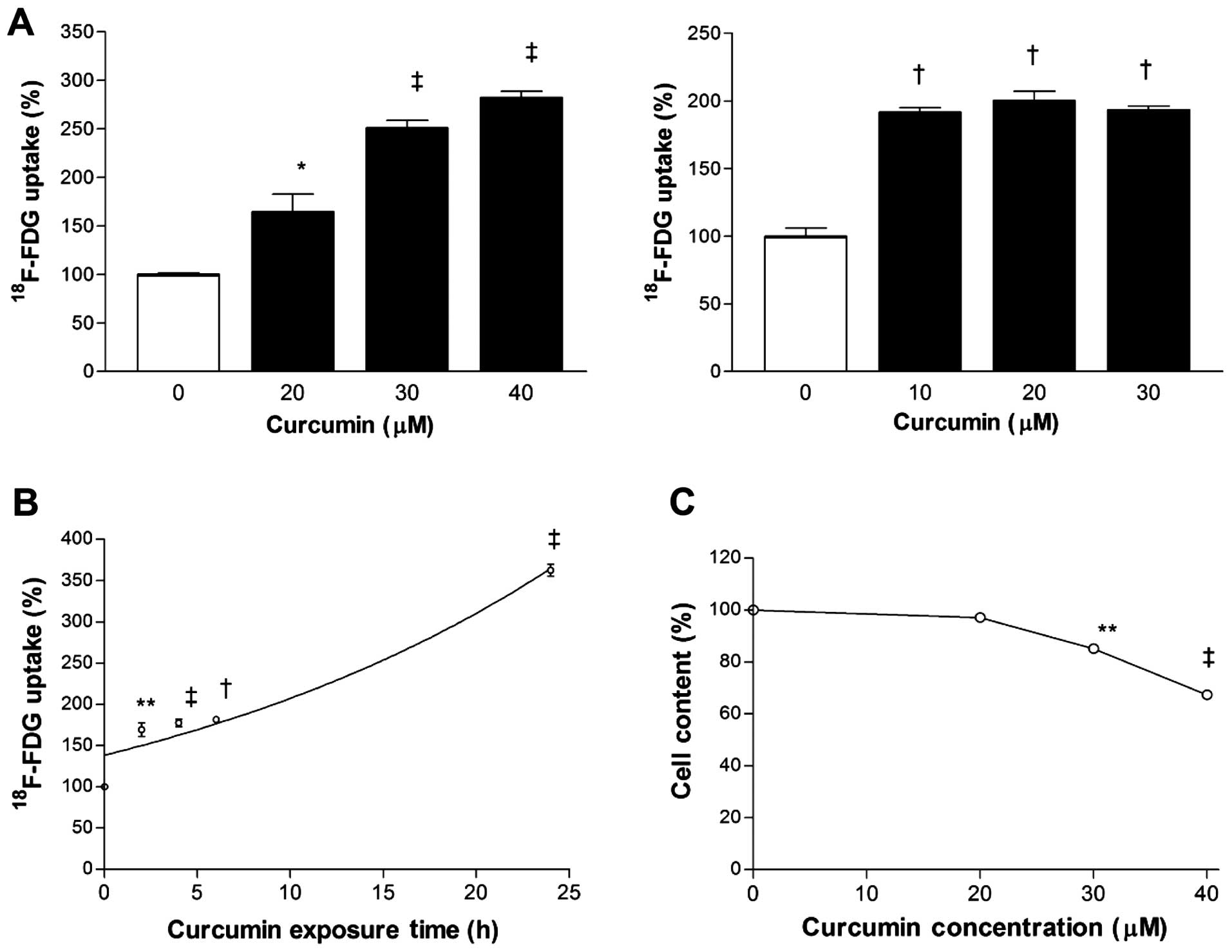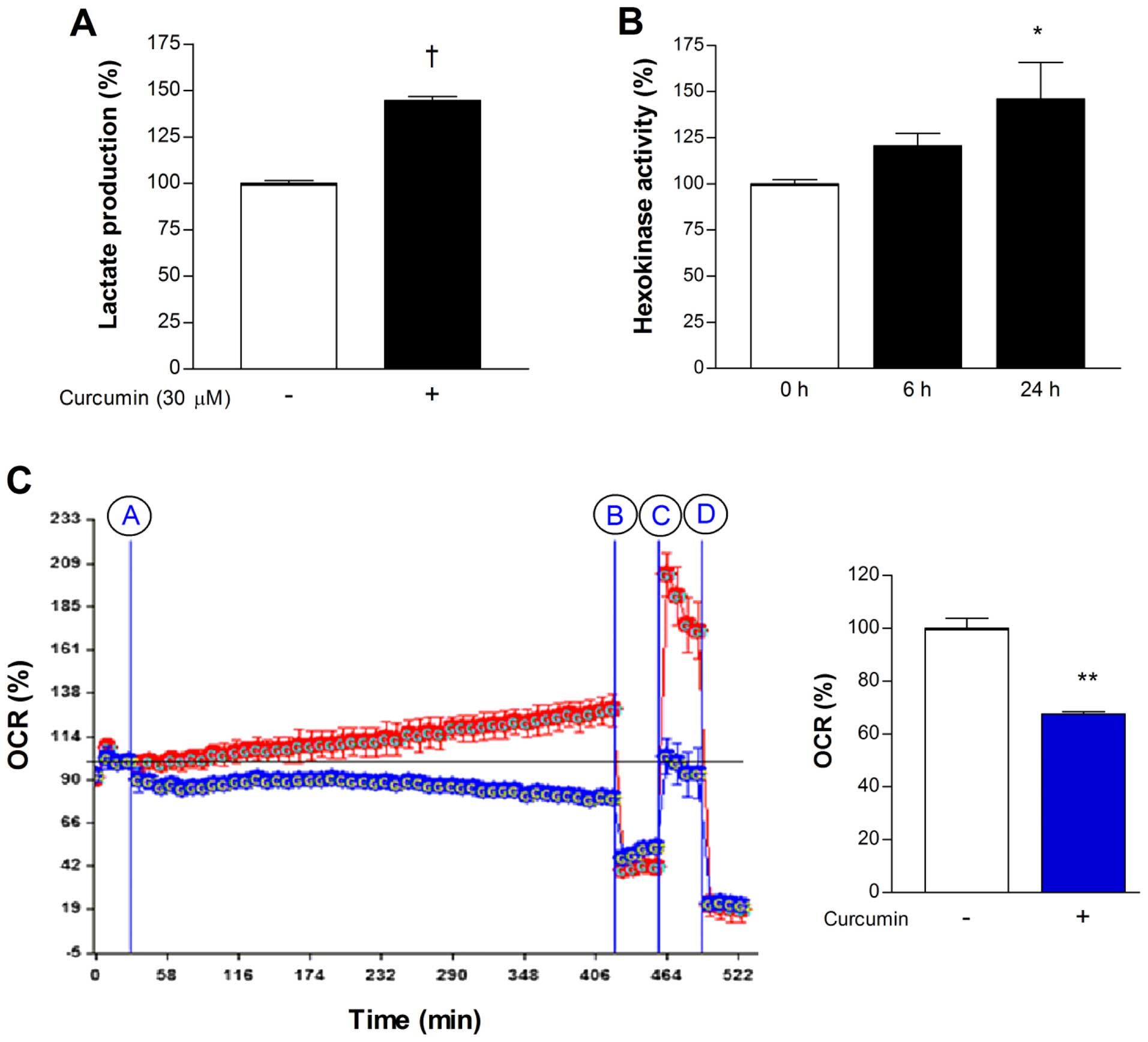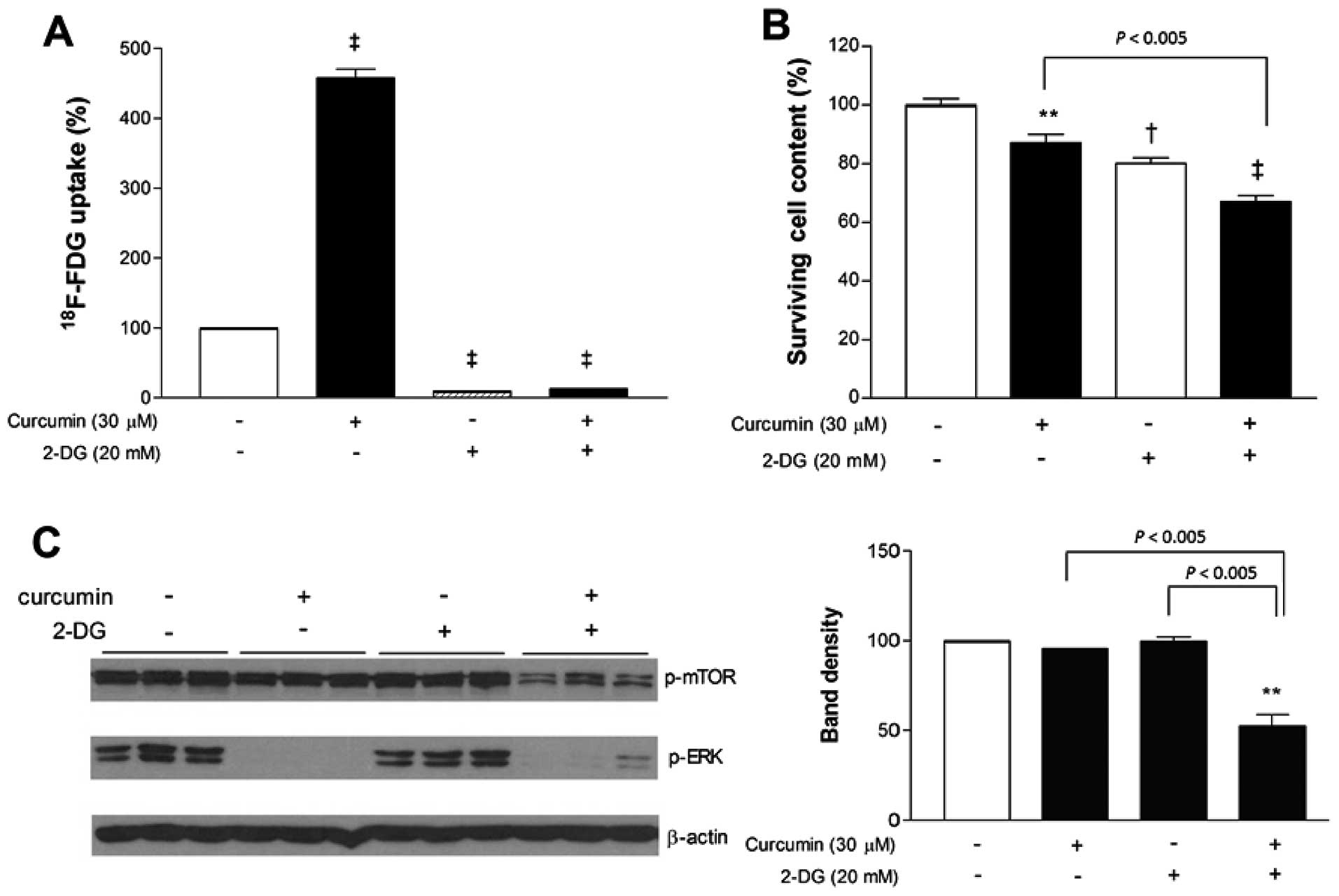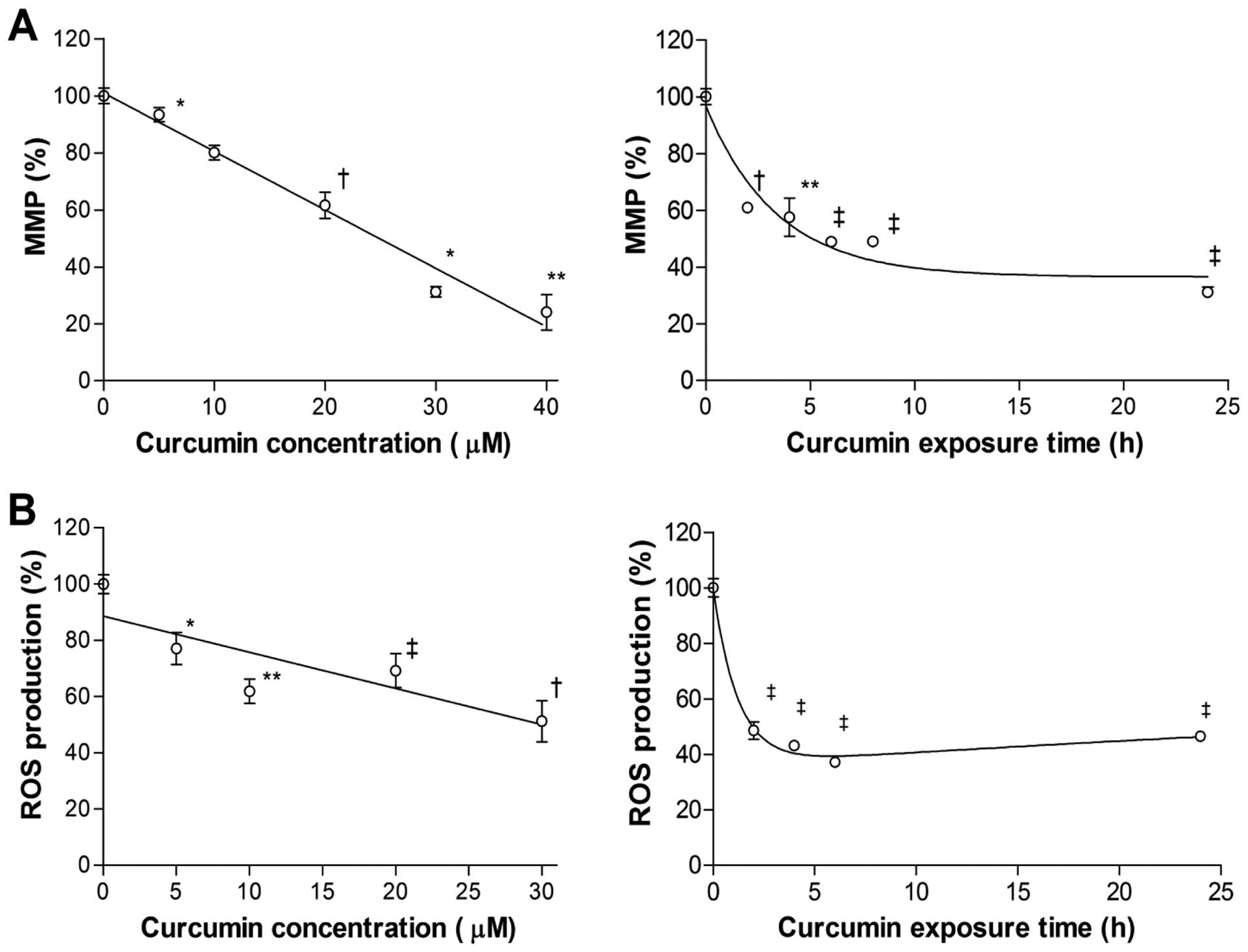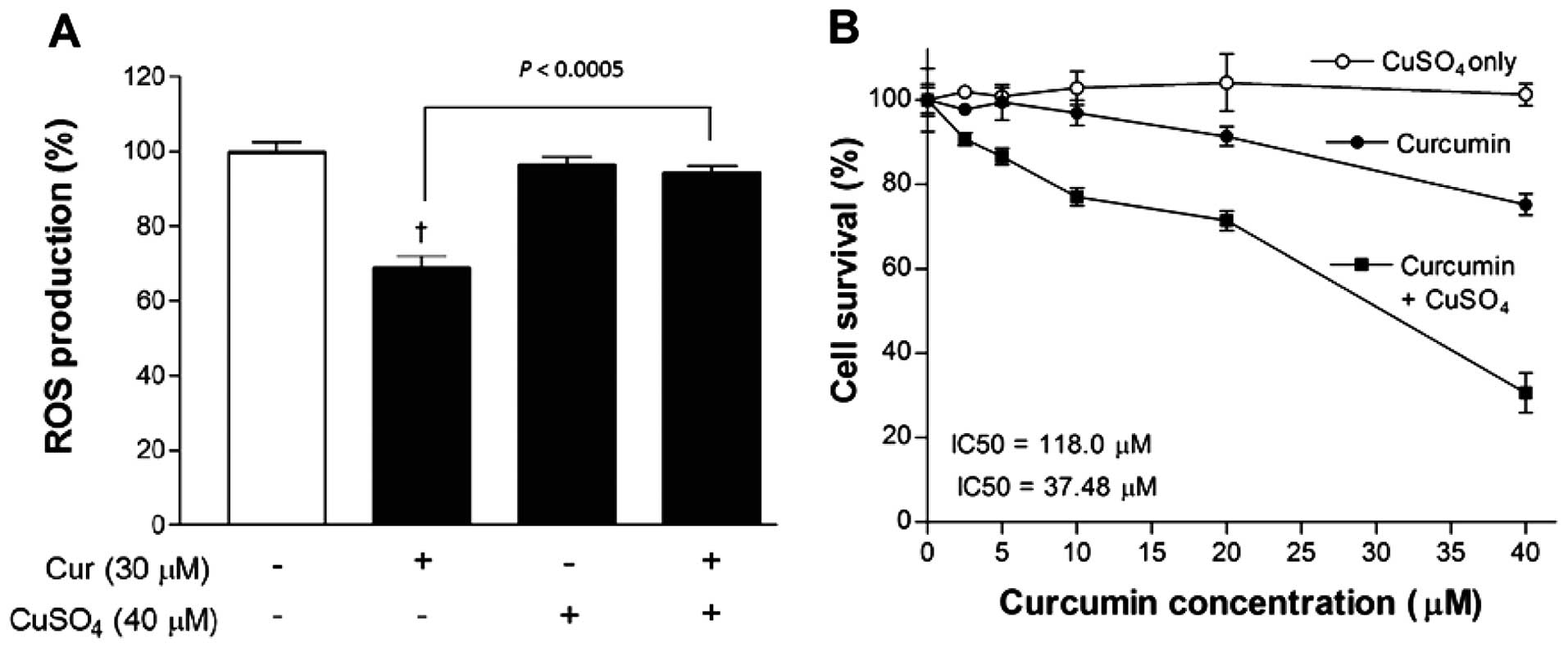|
1
|
Anand P, Sundaram C, Jhurani S,
Kunnumakkara AB and Aggarwal BB: Curcumin and cancer: An 'old-age'
disease with an 'age-old' solution. Cancer Lett. 267:133–164. 2008.
View Article : Google Scholar : PubMed/NCBI
|
|
2
|
Trujillo J, Granados-Castro LF, Zazueta C,
Andérica-Romero AC, Chirino YI and Pedraza-Chaverrí J: Mitochondria
as a target in the therapeutic properties of curcumin. Arch Pharm
(Weinheim). 347:873–884. 2014. View Article : Google Scholar
|
|
3
|
Hanahan D and Weinberg RA: Hallmarks of
cancer: The next generation. Cell. 144:646–674. 2011. View Article : Google Scholar : PubMed/NCBI
|
|
4
|
Zhao Y, Butler EB and Tan M: Targeting
cellular metabolism to improve cancer therapeutics. Cell Death Dis.
4:e5322013. View Article : Google Scholar : PubMed/NCBI
|
|
5
|
Larson SM and Schwartz LH:
18F-FDG PET as a candidate for 'qualified biomarker':
Functional assessment of treatment response in oncology. J Nucl
Med. 47:901–903. 2006.PubMed/NCBI
|
|
6
|
Sullivan LB and Chandel NS: Mitochondrial
reactive oxygen species and cancer. Cancer Metab. 2:172014.
View Article : Google Scholar
|
|
7
|
Cheng TC, Lin CS, Hsu CC, Chen LJ, Cheng
KC and Cheng JT: Activation of muscarinic M-1 cholinoceptors by
curcumin to increase glucose uptake into skeletal muscle isolated
from Wistar rats. Neurosci Lett. 465:238–241. 2009. View Article : Google Scholar : PubMed/NCBI
|
|
8
|
Kim JH, Park JM, Kim EK, Lee JO, Lee SK,
Jung JH, You GY, Park SH, Suh PG and Kim HS: Curcumin stimulates
glucose uptake through AMPK-p38 MAPK pathways in L6 myotube cells.
J Cell Physiol. 223:771–778. 2010.PubMed/NCBI
|
|
9
|
Hail N Jr: Mitochondrial reactive oxygen
species affect sensitivity to curcumin-induced apoptosis. Free
Radic Biol Med. 44:1382–1393. 2008. View Article : Google Scholar : PubMed/NCBI
|
|
10
|
Su CC, Lin JG, Li TM, Chung JG, Yang JS,
Ip SW, Lin WC and Chen GW: Curcumin-induced apoptosis of human
colon cancer colo 205 cells through the production of ROS,
Ca2+ and the activation of caspase-3. Anticancer Res.
26(6B): 4379–4389. 2006.
|
|
11
|
Ak T and Gülçin I: Antioxidant and radical
scavenging properties of curcumin. Chem Biol Interact. 174:27–37.
2008. View Article : Google Scholar : PubMed/NCBI
|
|
12
|
Kunwar A, Jayakumar S, Srivastava AK and
Priyadarsini KI: Dimethoxycurcumin-induced cell death in human
breast carcinoma MCF7 cells: Evidence for pro-oxidant activity,
mitochondrial dysfunction, and apoptosis. Arch Toxicol. 86:603–614.
2012. View Article : Google Scholar
|
|
13
|
Li YB, Gao JL, Zhong ZF, Hoi PM, Lee SM
and Wang YT: Bisdemethoxycurcumin suppresses MCF-7 cells
proliferation by inducing ROS accumulation and modulating
senescence-related pathways. Pharmacol Rep. 65:700–709. 2013.
View Article : Google Scholar : PubMed/NCBI
|
|
14
|
Priyadarsini KI: The chemistry of
curcumin: From extraction to therapeutic agent. Molecules.
19:20091–20112. 2014. View Article : Google Scholar : PubMed/NCBI
|
|
15
|
Verma SP and Goldin BR: Copper modulates
activities of genistein, nitric oxide, and curcumin in breast tumor
cells. Biochem Biophys Res Commun. 310:104–108. 2003. View Article : Google Scholar : PubMed/NCBI
|
|
16
|
Hadi SM, Asad SF, Singh S and Ahmad A:
Putative mechanism for anticancer and apoptosis-inducing properties
of plant-derived polyphenolic compounds. IUBMB Life. 50:167–171.
2000. View Article : Google Scholar
|
|
17
|
Liu D and Chen Z: The effect of curcumin
on breast cancer cells. J Breast Cancer. 16:133–137. 2013.
View Article : Google Scholar : PubMed/NCBI
|
|
18
|
Reddy CA, Somepalli V, Golakoti T,
Kanugula AK, Karnewar S, Rajendiran K, Vasagiri N, Prabhakar S,
Kuppusamy P, Kotamraju S, et al: Mitochondrial-targeted
curcuminoids: A strategy to enhance bioavailability and anticancer
efficacy of curcumin. PLoS One. 9:e893512014. View Article : Google Scholar : PubMed/NCBI
|
|
19
|
Wick AN, Drury DR, Nakada HI and Wolfe JB:
Localization of the primary metabolic block produced by
2-deoxyglucose. J Biol Chem. 224:963–969. 1957.PubMed/NCBI
|
|
20
|
Cheng G, Zielonka J, McAllister D, Hardy
M, Ouari O, Joseph J, Dwinell MB and Kalyanaraman B:
Antiproliferative effects of mitochondria-targeted cationic
antioxidants and analogs: Role of mitochondrial bioenergetics and
energy-sensing mechanism. Cancer Lett. 365:96–106. 2015. View Article : Google Scholar : PubMed/NCBI
|
|
21
|
Guo Y, Shan Q, Gong Y, Lin J, Shi F, Shi R
and Yang X: Curcumin induces apoptosis via simultaneously targeting
AKT/mTOR and RAF/MEK/ERK survival signaling pathways in human
leukemia THP-1 cells. Pharmazie. 69:229–233. 2014.PubMed/NCBI
|
|
22
|
Xie YQ, Wu XB and Tang SQ: Curcumin
treatment alters ERK-1/2 signaling in vitro and inhibits
nasopharyngeal carcinoma proliferation in mouse xenografts. Int J
Clin Exp Med. 7:108–114. 2014.PubMed/NCBI
|
|
23
|
Johnson SM, Gulhati P, Arrieta I, Wang X,
Uchida T, Gao T and Evers BM: Curcumin inhibits proliferation of
colorectal carcinoma by modulating Akt/mTOR signaling. Anticancer
Res. 29:3185–3190. 2009.PubMed/NCBI
|
|
24
|
Beevers CS, Li F, Liu L and Huang S:
Curcumin inhibits the mammalian target of rapamycin-mediated
signaling pathways in cancer cells. Int J Cancer. 119:757–764.
2006. View Article : Google Scholar : PubMed/NCBI
|
|
25
|
Jiang W, Zhu Z and Thompson HJ: Modulation
of the activities of AMP-activated protein kinase, protein kinase
B, and mammalian target of rapamycin by limiting energy
availability with 2-deoxyglucose. Mol Carcinog. 47:616–628. 2008.
View Article : Google Scholar : PubMed/NCBI
|
|
26
|
Wu SH, Hang LW, Yang JS, Chen HY, Lin HY,
Chiang JH, Lu CC, Yang JL, Lai TY, Ko YC, et al: Curcumin induces
apoptosis in human non-small cell lung cancer NCI-H460 cells
through ER stress and caspase cascade- and mitochondria-dependent
pathways. Anticancer Res. 30:2125–2133. 2010.PubMed/NCBI
|
|
27
|
Cao J, Liu Y, Jia L, Zhou HM, Kong Y, Yang
G, Jiang LP, Li QJ and Zhong LF: Curcumin induces apoptosis through
mitochondrial hyperpolarization and mtDNA damage in human hepatoma
G2 cells. Free Radic Biol Med. 43:968–975. 2007. View Article : Google Scholar : PubMed/NCBI
|
|
28
|
Suski JM, Lebiedzinska M, Bonora M, Pinton
P, Duszynski J and Wieckowski MR: Relation between mitochondrial
membrane potential and ROS formation. Methods Mol Biol.
810:183–205. 2012. View Article : Google Scholar
|
|
29
|
Gorrini C, Harris IS and Mak TW:
Modulation of oxidative stress as an anticancer strategy. Nat Rev
Drug Discov. 12:931–947. 2013. View Article : Google Scholar : PubMed/NCBI
|
|
30
|
Lou JR, Zhang XX, Zheng J and Ding WQ:
Transient metals enhance cytotoxicity of curcumin: Potential
involvement of the NF-kappaB and mTOR signaling pathways.
Anticancer Res. 30:3249–3255. 2010.PubMed/NCBI
|
|
31
|
Lu JJ, Cai YJ and Ding J: The short-time
treatment with curcumin sufficiently decreases cell viability,
induces apoptosis and copper enhances these effects in
multidrug-resistant K562/A02 cells. Mol Cell Biochem. 360:253–260.
2012. View Article : Google Scholar
|
|
32
|
Urbina-Cano P, Bobadilla-Morales L,
Ramírez-Herrera MA, Corona-Rivera JR, Mendoza-Magaña ML,
Troyo-Sanromán R and Corona-Rivera A: DNA damage in mouse
lymphocytes exposed to curcumin and copper. J Appl Genet.
47:377–382. 2006. View Article : Google Scholar : PubMed/NCBI
|
|
33
|
Li Y and Trush MA: Reactive
oxygen-dependent DNA damage resulting from the oxidation of
phenolic compounds by a copper-redox cycle mechanism. Cancer Res.
54(Suppl): 1895s–1898s. 1994.PubMed/NCBI
|
|
34
|
Ahsan H and Hadi SM: Strand scission in
DNA induced by curcumin in the presence of Cu(II). Cancer Lett.
124:23–30. 1998. View Article : Google Scholar : PubMed/NCBI
|
|
35
|
Ahsan H, Parveen N, Khan NU and Hadi SM:
Pro-oxidant, anti-oxidant and cleavage activities on DNA of
curcumin and its derivatives demethoxycurcumin and
bisdemethoxycurcumin. Chem Biol Interact. 121:161–175. 1999.
View Article : Google Scholar : PubMed/NCBI
|
|
36
|
John VD, Kuttan G and Krishnankutty K:
Anti-tumour studies of metal chelates of synthetic curcuminoids. J
Exp Clin Cancer Res. 21:219–224. 2002.PubMed/NCBI
|
|
37
|
Leung MH, Harada T and Kee TW: Delivery of
curcumin and medicinal effects of the copper(II)-curcumin
complexes. Curr Pharm Des. 19:2070–2083. 2013.
|















